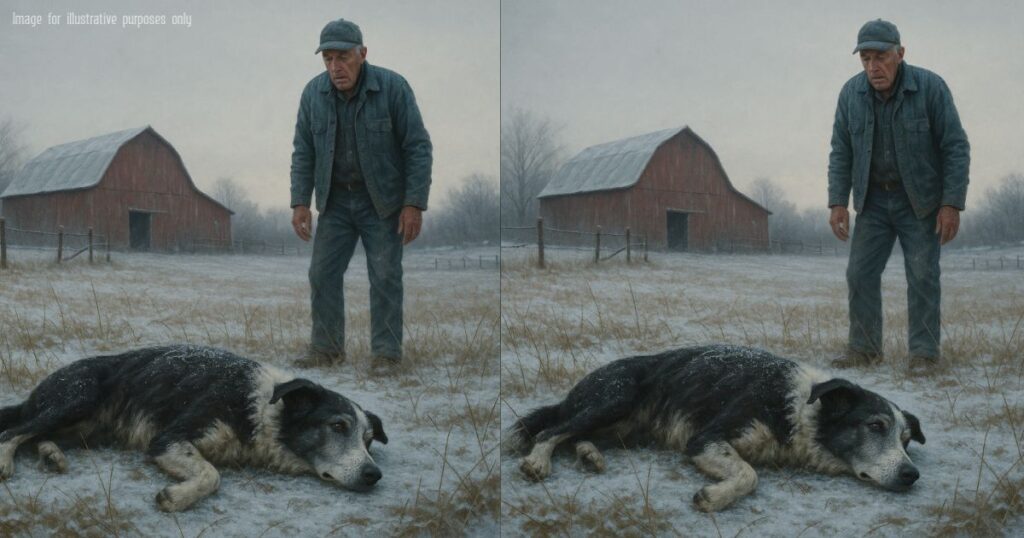It stared at him like it had been waiting.
Roy lowered the flashlight. “You real?” he asked aloud, voice cracked with sleep and disbelief.
The dog didn’t move.
He stepped closer, slowly. “You lost?”
No collar. No tag. No sign of fear, either.
Just that look — one Roy knew too well. A working dog’s look. Focused. Listening. Waiting.
He crouched, ignoring the way his knees screamed. Held out a hand.
The dog limped forward. Slowly. One step. Then another. Until his nose touched Roy’s knuckles.
Roy swore under his breath. “Where the hell did you come from?”
The dog leaned against his leg. Cold. Trembling. And so damn familiar it made something deep in Roy’s chest crack open like an old photograph found in the attic.
He named her “Junie” the next morning. Didn’t know why. It just felt right.
—
Junie wasn’t Jasper. She was faster. Wilder. And maybe broken.
She wouldn’t eat from a bowl, only off the porch. She flinched at doors. Slept with one eye open for the first week. But when Roy took her out by the pasture, she lit up like someone had plugged her into the sun.
She ran.
Ran fast. In wide arcs. Herding shadows.
Roy watched her from the porch, tears gathering in his beard.
“I don’t know who left you here,” he muttered. “But I’m damn sure not letting you go.”
—
He took Junie with him to the school.
The kids loved her. The boys gave her beef jerky. The girls tied ribbons to her collar.
But Junie didn’t care about any of that.
She only listened to Roy.
The ag teacher, Miss Devlin, a sharp woman in her early thirties with a voice like radio gravel, asked Roy if he’d consider mentoring the students on weekends. “You’re a relic,” she said. “But you’re a useful one.”
Roy laughed for the first time in weeks.
He taught them how to check for hoof rot, mend broken wire, and use baling twine like duct tape. Showed them the right way to swing a post hammer and the wrong way to argue with a sick ewe.
One Saturday, he brought out the last wooden crook he’d carved with his father in 1957.
“This stick,” he said, holding it up, “turned more heads than a siren back in the day. Sheep or people.”
They laughed. But they listened.
That afternoon, while the students hauled hay to the training pen, Roy sat on a stump near the fence line, Junie at his feet.
And for the first time since Jasper’s howl, the silence didn’t hurt.
—
But silence, like winter, always returns.
Late January brought the storm.
A bad one. Power out for three days. Roads iced. Trees snapping under their own weight.
Roy had the fire going and canned chili in the pantry. He was fine.
Until Junie went missing.
He didn’t notice until morning. The porch was empty. Her blanket untouched.
He called. Whistled. Drove the truck through the back road, horn blaring.
Nothing.
He searched for two days.
On the third morning, the school called. A student had found her curled behind the ag barn. Paw gashed, fur matted, shivering from the cold.
Roy drove faster than he had in years.
She limped to him when she saw the truck, tail wagging weakly.
“Damn fool girl,” he whispered, wrapping her in a blanket and holding her tight.
The vet patched her up.
But Roy didn’t sleep that night. He sat by the fire, Junie beside him, her breathing slow and heavy.
He stared into the flames and said aloud what he hadn’t told anyone, not even God.
“I thought I was done. I thought I had nothing left to give.”
Junie shifted, placed her head on his foot.
And Roy understood.
He hadn’t saved her.
She had saved him first.


